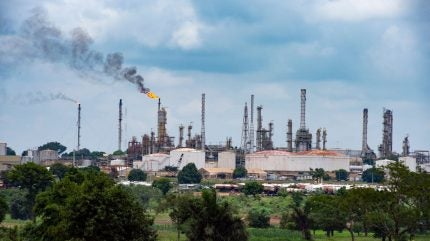
The state-owned Nigerian National Petroleum Company (NNPC) has declared a state of emergency on production in Nigeria’s oil and gas industry in an effort to increase its crude oil production and reserves.
At the Nigeria Oil & Gas Conference and Exhibition in Abuja on 2 July, NNPC’s CEO, Mele Kyari, said: “We have declared war on the challenges affecting our crude oil production. War means war. We have the right tools. We know what to fight.”
He added: “We know what we must do at that level of assets. We have engaged our partners and will work together to improve the situation.”
According to Kyari, a detailed analysis of assets revealed that Nigeria could easily produce two million barrels of crude oil per day without deploying new rigs.
Yet, in Nigeria the “inability of players to act in a timely manner” remains a challenge.
NNPC plans to replace all crude oil pipelines built more than 40 years ago and introduce a rig-sharing programme with its partners to ensure the lifespan of the production rigs is four to five years, as part of its medium to long-term measures to boost and sustain production.
Kyari stated that the “war” would enable NNPC and its partners to promptly overcome all identified challenges, to create more effective and efficient production, and reducing delays in procurement processes.
The company plans to invest in essential midstream gas infrastructure including the Obiafu-Obrikom-Oben (OB3) and the Ajaokuta-Kaduna-Kano gas pipelines to enhance domestic gas production and supply for electricity generation.
Nigerian President Bola Tinubu has consistently reiterated his administration’s commitment to supporting increased domestic gas utilisation, improving the country’s power generation capacity, revitalising industries and creating numerous job opportunities for economic development.
Along with one of its partners, NIPCO Gas, the government-owned energy company has constructed several compressed natural gas (CNG) stations, 12 of which will be commissioned on 4 July in Lagos and Abuja.
The CNG initiative aims to transition Nigeria from using petrol and diesel as vehicular combustion fuel. Tinubu stated in May that significant advancements have also been made in promoting gas development through various presidential directives.
Offshore Technology reported that the three gas plants launched on 15 May 2024 in the country’s Delta and Imo states would boost the country’s gas supply by 25%, once they operate at full capacity.
Nigeria’s oil exploration and production regulator aims to increase the country’s oil and condensates production to 2.6 million barrels per day (mbbl/d) by 2026, marking a significant increase from 2023 production levels of around 1.6mbbl/d.




